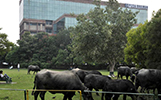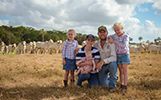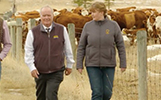| The beef industry needs to constantly engage on the issues of public trust and shared values. There is no doubt that consumers still enjoy beef, but they are constantly exposed to mixed messages about the impact of the industry in all areas covered by our principles and criteria, that can cause them to question whether the industry is doing things responsibly.
Telling people that it's okay is one thing, showing them why it is, or how it is being improved is much more convincing. Again technology can bring consumers closer to producers and let them see how things work. Lower on the page under "tech already in the paddock" you can read about virtual fencing. Depending on where you produce, fencing can be a major cost both in infrastructure and labour – some properties in Australia are measured in thousands of square km or miles. Any technology that could improve grazing management without huge investment in fencing would be very welcome.
Beef Australia 2018: Industry Uses Virtual Reality to Address Consumer Concerns About Environment and Animal Welfare 
Kallee Buchanan, ABC Local | May 10, 2018
Beef producers are using innovation to address rising pressures from environmental and animal activists about how the industry operates.
The growing demand for transparency and ethically, socially and environmentally sustainable food has been one of the topics up for discussion at Beef Australia 2018, the industry's biggest expo.
Meat and Livestock Australia, a producer–owned red meat industry research, development and marketing organisation, has used virtual reality to try to educate consumers about the supply chain.The virtual reality experience follows an animal on a cattle station being moved into a feedlot and on to processing at an abattoir before landing on the plate in a restaurant. Community programs manager Fiona Young said the virtual 'paddock to plate' experience had proven an effective way to address misconceptions about the industry.
India is a very large (in some years the largest) beef exporter – albeit predominantly buffalo meat. The fact that FMD is still widespread and endemic is a major obstacle to the development of that export market and increasing its value. The article mentions a figure of 3500 crore rupees required to eradicate the disease from the country – that translates into roughly USD 520 million.
India Banks On Animal Health Survey by World Body Experts to Beef Up Meat Exports 
NYOOOZ, Hindustan Times | April 30, 2018
The ministry of environment, forest and climate change (MoEFCC) and the ministry of animal husbandry are working with the World Organisation for Animal Health (OIE) for the survey.
OIE has taken up survey on quality of veterinary services in more than 130 countries.
"The central government needs an investment of Rs 3500 crore to make our country free from FMD," said Fauzan Alavi, spokesperson of the All India Meat and Livestock Exporters Association.
"The programme helps establish niche services and quality of meat as per international standards," said Sussane Munnstermann, an expert from OIE who reviewed veterinary services in Dehradun–based Wildlife Institute of India.
Another example of how technology could monitor aspects of sustainability – in this case using tail hair samples to gain better understanding of welfare. I won't pretend to understand exactly how that would work in practice, since the data would always be historical, and it would be hard to distinguish the cause of stress measured in the hair sample. However, if cattle from particular sources show consistently higher levels of stress than other samples in a similar environment, it would at least provide an alert that causes of stress need to be looked into.
Consortium Aims to Put Evidence Behind Cattle Welfare Claims
James Nason, Beef Central | May 11, 2018
Tail–hair tests could soon be used on Australian cattle properties to objectively measure and assess the welfare of cattle, under a new national research consortium launched at Beef 2018 on Thursday.
The tests are one of a suite of biomarkers the new national research centre will explore to provide objective assessments of animal welfare to support the Australian beef industry's sustainability claims.
Dr. Allen Tillbrook said the Australian Framework for Sustainable Beef recognised the importance of industry being able to provide honest feedback on its progress toward sustainability, and to do that it needed objective measures.
The positive example of Nuffield scholars such as Stewart Borg are one of the reasons that we are aiming to profile young sustainability leaders in our Global Conference in October. The open and transparent attitude displayed by many will pay dividends in the long run.
Open Your Gates to the Public, Says Young Beef Ambassador 
Shan Goodwin, Queensland Country Life | May 11, 2018
Third generation beef producer Stewart Borg believes it's time farmers, lotfeeders and processors open their gates to the general public and both show and talk more about what they do on a day–to–do basis.
Inaccurate perceptions around environmental stewardship and animal welfare need to be rectified if the beef industry is to have a future, he says, and those on the ground are the only ones who can do it.
"We are leading the way worldwide in best management practices and sustainable beef production but the people who count most, consumers, don't know it," he said.
This is an impressive story of a rancher who has recognised important issues that need solving (Bovine Respiratory Disease amongst others) and has invested a significant amount of money to find solutions that will benefit the entire industry.
Rancher Donates $2 Million to Take Beef Industry Where It 'Needs to Go' 
Alexis Kienlen, Alberta Express | May 8, 2018
The cattle sector has made big advances in livestock health and wellness, but needs to do more, says a rancher who donated $2 million for a new research chair to make that happen.
"This has nothing to do with bad treatment of animals — it has to do with better treatment, better protocol, better records, and better looking after of the animals so when they get to market, they will be better for people to eat," said John Simpson, who operates Simpson Ranching near Cochrane with his daughter Christie and son Luke.
"The industry has moved to an industry that wants to know what kind of upbringing the animals have had, what kind of feed they've had and what kind of drugs they've had, if any."
Meat Substitutes Take on Meat Industry 
Sara Muirhead, Feedstuffs | April 26, 2018
Meat protein is still king. In fact, there is little indication that consumers are, or will be, turning away from meat protein anytime soon.
Still, meat substitutes potentially are on the verge of creating a global market disruption.
It is a disruption that, if significant in scope, could dramatically change food companies such as Tyson Foods, Pilgrim's Pride and Sanderson Farms, which rely on meat products for 80% or more of their revenue. Such a disruption could even, at some point, upend all parts of the meat production process, from farm to fork.
I included a reference and link to the NCBA report on U.S. Beef Cattle Identification and Traceability Systems in a previous connect. This article is a succinct summary of the issue, and recognises the work being done by NIAA with the Cattle Traceability Working Group.
Wishful Thinking Never the Answer 
Dr. Nevil Speer, Feedstuffs | April 20, 2018
The consultant group World Perspectives recently published a comprehensive review on behalf of the National Cattlemen's Beef Assn.: U.S. Beef Cattle Identification and Traceability Systems.
The report highlights the following: "In an increasingly competitive global marketplace, beef industry animal identification and traceability systems are the norm. However, despite being a globally recognized leader in all points of the beef value chain, the U.S. currently does not have robust, nationally significant animal identification and traceability system(s) in place for its domestic beef industry. This may be hampering the industry's effort, at all points along the value chain, to capture maximum value from: - Enhanced domestic consumer confidence and ever–changing demand drivers;
- Growing global protein demand in new markets, and continued opportunities to differentiate U.S. supply in existing markets, and
- The ability to better manage, and cushion the shock of, animal disease outbreaks."
Those are key points addressing "why" traceability needs to continually evolve. | |
